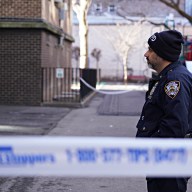By Sarah Ferguson
Tuesday morning brought back-to-back victories for East Village activists fighting to restore the old P.S. 64 school on E. Ninth St. as a community center.
First, the city’s Board of Standards and Appeals voted unanimously to uphold the Department of Buildings’ decision to deny developer Gregg Singer a permit to put up a 19-story dormitory on the site because he does not have any universities lined up to lease the place.
Then the city’s Landmarks Preservation Commission voted to calendar P.S. 64 for a public hearing to determine whether the 100-year-old former elementary school should be preserved as a neighborhood landmark.
Supporters were ecstatic at the news. “I cannot tell you how full of rejoicing I am. I feel like my heart is exploding,” said Councilmember Margarita Lopez, who has fought vociferously to preserve the building as a cultural center in the model of CHARAS/El Bohio, which was displaced when the Guiliani administration auctioned the building to Singer in 1998.
Lopez said she considered preserving P.S. 64 a key component of her political legacy on the Lower East Side. “Today I am so much in peace inside of me,” she said. “Because to me, this is the last item that I need to ensure is completed when I leave the Council. And I feel that today we have completed the humongous step in proving clearly that this building is for community services, and not for the the purpose of somebody to make millions of dollars,” she said, referring to the B.S.A.’s rejection of Singer’s speculative dorm scheme.
“Now what is left is the landmarking, and I tell you today that this this building will be landmarked,” Lopez vowed. She made her remarks shortly before the Landmarks Preservation Commission announced it was calendaring P.S. 64 for a hearing — leading some to speculate about a possible deal between Lopez and Mayor Michael Bloomberg, whom Lopez endorsed last week. Although the Landmarks Commission is technically an independent body, its commissioners are appointed by the mayor and hence generally act in tandem with the administration’s wishes.
Lopez was backed by her likely successor, Rosie Mendez, Democratic nominee for City Council District 2, who credited the spirit of Armando Perez, the murdered community leader who helped found CHARAS, with helping influence both agencies’ decisions. “His birthday is coming up, and good things always happen around his birthday,” she said.
Mendez said the B.S.A.’s rejection of Singer’s appeal could have ramifications citywide. “This sets an important precedent,” she said, “that developers won’t be able to use the community facility-use bonus as a loophole to build dorms when what they really want is to do is convert them into luxury apartments” — an allegation that Singer and his attorneys have repeatedly denied.
Members of the East Village Community Coalition, which formed to oppose the dorm scheme, were all but counting crow. “The noose is tightening,” said a gleeful Roland Legiardi-Laura, a teacher and filmmaker who lives less than a block away from P.S. 64. “If I were Gregg Singer I would be sitting down with a calculator and figuring out how much I could get for the building as is.”
Although getting approved for a public hearing is still a far cry from preservation, Legiardi-Laura said the odds are good because the Landmarks Commission generally designates those properties it calendars. “Mr. Singer must now understand that he is in opposition not just to the East Village and its various factions, but to the Bloomberg administration itself. If he wants to take on the whole city, he’s got himself quite a fight,” Legiardi-Laura boasted.
But Singer and his team of attorneys aren’t backing down. Immediately after the B.S.A. issued its ruling, Singer announced plans to file a lawsuit challenging the decision, which he termed “a complete and utter misinterpretation of the zoning regulations.”
In a written statement to the press, Singer accused the city of seeking to reinterpret the zoning rules after the fact — an act he claimed “amounts to illegal taking of property.”
“Today’s decision sets a very dangerous precedent for the city — one which future bidders on city properties will need to take into account before they bid. That is, that the city may sell you a site with a determined restriction only to attempt to change its zoning use after the fact. This amounts to an illegal taking of property.”
The B.S.A. commissioners did not comment on their vote, and the resolution explaining the rationale behind their decision will not be released until noon Wednesday, after The Villager has gone to press. But at a hearing last August, an attorney for the Department of Buildings argued that the city had the right to reject Singer’s 19-story dorm scheme because he did not have any leases in place with area universities. Instead, Singer proposes to lease space to schools “as need arises.”
E.V.C.C. supporters concede that Singer may find more “leeway” from the courts. But a legal battle could take a year or more to resolve, and in the meantime Community Board 3 is moving to downzone the neighborhood, which would restrict Singer’s ability to build higher anyway if he has not built the dorm’s foundation before the zoning goes into effect.
For now, his plans to build the dorm are put in check by the Landmarks Commission’s decision to calendar the building, which prevents him from getting any new permits on the site for at least 40 days.
Responding to the decision by the Landmarks commission, Singer issued the following statement:
“We are reviewing the decision by the Landmarks Preservation Commission to calendar the building for a hearing. We understand the significance of the building to the community, which is why we have included the original structure in our proposed plans. In addition, we have always worked to incorporate a community-based organization as a tenant in the building’s future.”
In fact, while Singer has proposed incorporating the front facade and courtyard as the base of his 19-story dorm, he already has a permit in place to demolish the ornate cornices and other cast-stone elements of the facade, which would significantly diminish the building’s historic value.
Even if the building is granted landmark status, that would not prevent Singer from acting on that permit.
But Landmarks Chairperson Robert Tierney implied that the city would strongly look down on such a ploy. “I would hope and expect that no actions will be taken to compromise the historic integrity of the property that we now have under review,” Tierney told The Villager.
Legiardi-Laura said the community would raise funds to restore any historic ornaments that Singer might try to lop off the building.
Tierney said he expects the commission to hold a public hearing “within several weeks” and said the commission would rule “not long after.”
In its “statement of significance,” which the Landmarks Commission issues prior to calendaring a hearing, the commissioners cited P.S. 64 for its “rare Baroque-revival style.” Designed in 1903-’04 by famed architecht C. B. J. Snyder, the school was one of the first to introduce a ground-floor auditorium, which allowed it to function after hours as a community center. Among those to lecture there during the 1920s were former Mayor Jimmy Walker and governors Alfred E. Smith and Franklin D. Roosevelt.
According to Landmarks’ prehearing assessment: “Snyder designed P.S. 64 when he was at the height of his powers, having mastered the technicalities of school design and construction. P.S. 64 is an unusually intact example of a school building retaining its original fence and sculptural seals and, unlike many H-plan schools, it has not had an addition.”




































